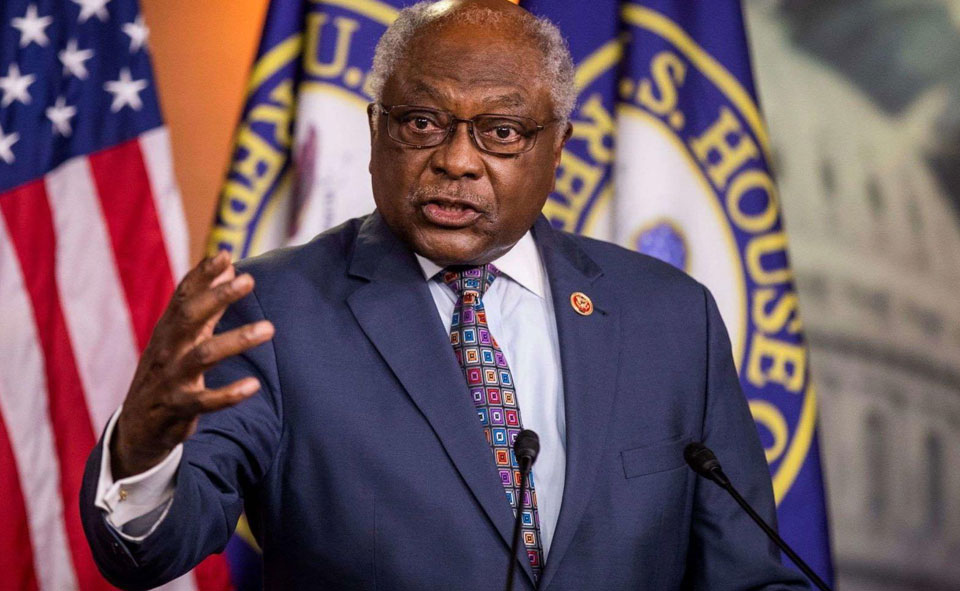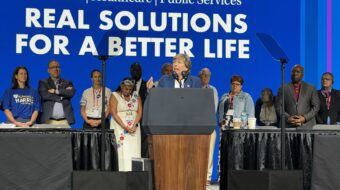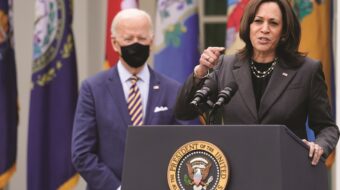
WASHINGTON —The special House committee investigating the federal government’s response, or lack of it, to the coronavirus plague has opened an investigation of big meatpackers’ refusal to protect their workers against the contagion.
In Feb. 1 letters to the nation’s three big meatpacking firms and the Occupational Safety and Health Administration (OSHA), Rep. James Clyburn, D-S.C., the panel chair, laid out in stark terms both the illness and death tolls in the industry during the GOP Trump regime, and the lack of OSHA enforcement.
The letters to OSHA and the CEOs of JBS, Smithfield, and Tyson Foods point out that at least 54,000 meatpacking workers have tested positive for the virus at 569 plants, industry-wide, and at least 270 have died.
Worse, “according to a study by the National Academy of Sciences, meatpacking plants were associated with 236,000-310,000 coronavirus cases and 4,300-5,200 deaths” nationwide as of last July 21. “These findings suggest these plants may act as transmission vectors into the surrounding population and accelerate the spread of the virus” in their communities.
Yet “fewer than half of” the 45 plants the three big packers own “ordered wide-scale employee testing. Many plants reportedly rejected testing offered by state authorities without arranging for alternative testing. Others reportedly told employees they needed to get tested ‘on their own.’”
Clyburn’s Select Committee on the Coronavirus Crisis seeks records of all complaints to OSHA about working conditions at the plants, the priority OSHA gave to each, and fines and other penalties. But the letters make clear the panel, working from news reports and other evidence, takes a dim view of the meatpackers’ inactions and OSHA’s laxity.
The fine against the Smithfield plant in Sioux Falls, S.D., where 1,294 workers tested positive and at least four died, was $13,494 for just one violation of OSHA’s “General Duty Clause” which orders firms to protect workers.
And the fine against Tyson for the outbreak at its Waterloo, Iowa, plant, where bosses established a betting pool on how many workers would get sick (1,000 so far) and how many would die (six) has not been disclosed. Some bosses were fired, Clyburn’s letter to Tyson’s CEO says, but the firm took no other action.
“Given the hundreds of meatpacking worker deaths associated with meatpacking plants, there is ample evidence of the grave risk they have faced at their jobs during the pandemic. Yet rather than use its authority to create an enforceable standard…OSHA only suggested non-binding guidance that companies are free to ignore,” the panel’s letter to James Frederick, the top career official at OSHA—who is currently running it—says.
“Under the Trump administration, OSHA failed to bring meaningful enforcement actions against meatpacking companies that violated existing worker safety standards during the pandemic.
“OSHA issued penalties related to the coronavirus totaling over $3.9 million, but the agency issued only eight citations and less than $80,000 in penalties for coronavirus-related violations at meatpacking companies. These citations address only a tiny fraction of the thousands of instances of coronavirus infections, and hundreds of virus-caused deaths.”
OSHA citations for worker safety violations took so long—five or six months each—and the fines were so small that plant bosses were undeterred from continuing to force workers to toil in unsafe conditions, Clyburn’s letter to OSHA says.
The letter to OSHA also demands “all documents related to any policies, directives, training, or other guidance regarding inspections of meatpacking and processing facilities during the coronavirus pandemic”—a polite reference to GOP White House occupant Donald Trump’s dictate early last year that meatpacking workers were “essential” and must stay on the job, virus or no virus.
The results, the letters say, gave plant owners free license to not protect their workers, and resulted in multitudes of deaths and illnesses not just in the meatpacking plants themselves, but in surrounding communities. The House panel did not mention that a high proportion of workers at the plants are workers of color, with many of the Spanish-speaking meatpacking workers being undocumented.
At both Waterloo and Sioux Falls, the workers’ union, the United Food and Commercial Workers both alerted the public to the outrages and led campaigns to shut the plants down until they were cleaned and the workers were protected. Local officials, however, resisted. And at a Tyson plant in Rock Island, Ill., the bosses turned down a county health department offer “to set up facility-wide testing through a local clinic.”
The panel wanted documents and information from both OSHA and the three companies by Feb. 15. The firms had no immediate comment.












Comments